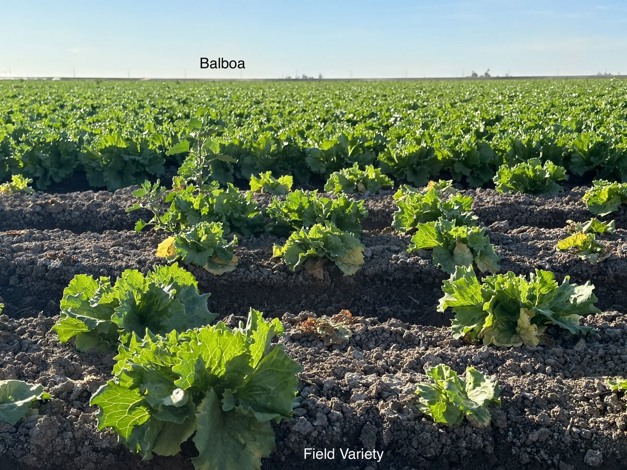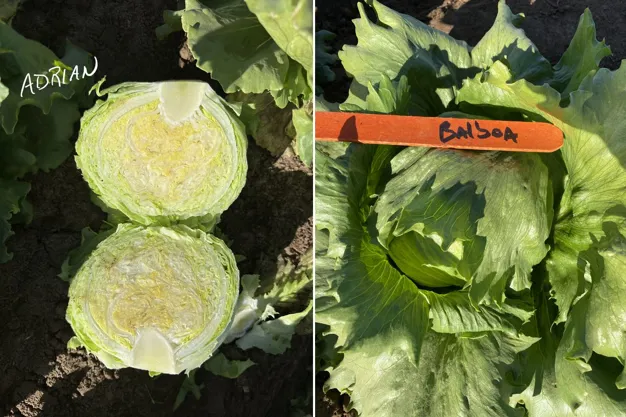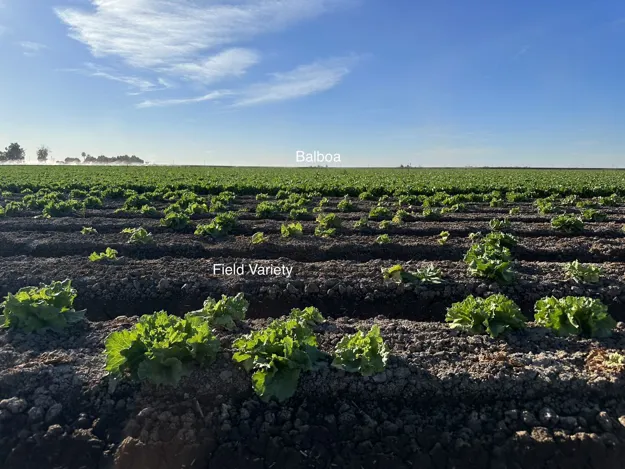Fusarium is a fungus that’s been prone to infect lettuce – predominantly iceberg - in several parts of the world. In Arizona, the disease has been around since 2001. While it was first contained in one field, it has since then spread through lettuce production areas of the Southwestern US. The problem is that it spreads very easily through people and machinery. Even cleaning machinery hasn’t stopped the spread.
“Once a plant has been infected, Fusarium gets into the root system, preventing the plant from taking up nutrients or water and causing it to die,” says Davie Brooks with Greengo Seed in Yuma, Arizona. Since the plants are affected from underground, it is hard to discover infected plants at first. Droopy leaves are the first sign, followed by the plant drying out and turning brown. “Once a field is infected, the only way to turn things around is to fumigate by applying chemicals,” commented Brooks. “However, most chemicals are no longer allowed to be used, and this solution is only effective for about two years.” After that, the Fusarium will start popping up again.
In addition to Yuma, which supplies 90 percent of lettuce grown in the US in winter, the Salinas region in California also witnesses some problems with Fusarium. “Although it is more widespread in Yuma, it is becoming an issue in Salinas as well,” commented Brooks. Furthermore, the same strain of Fusarium, Fol:1, is affecting lettuce production in Spain, an important lettuce supplier for Europe in winter.
 Fusarium-resistant variety Balboa in the back and regular field variety impacted by Fusarium in front.
Fusarium-resistant variety Balboa in the back and regular field variety impacted by Fusarium in front.
Fusarium-resistant varieties aren’t perfect
In the past five years, Greengo Seed has worked on the development of Fusarium-resistant varieties, and it’s the second year they have been planted commercially. Since then, the impact of Fusarium has decreased. “We have developed four iceberg lettuce varieties that are Fusarium resistant, including Adrian, Balboa, Mickey, and Paulie,” said Brooks. While the performance of these varieties is okay, many growers are still trying to use the old varieties they are used to. “The main reason is that the new varieties aren’t as adaptable as the old ones,” he shared. “They aren’t as bolt tolerant or sure heading, and the shape isn’t as pretty.” In addition to the Yuma region, Greengo Seed will also be sending over Fusarium-resistant seeds to Spain this winter.

Fusarium-resistant iceberg lettuce varieties Adrian and Balboa.
Improved varieties
However, Greengo Seed is working on developing new varieties that better align with the varieties growers are used to. The company is working on 40 new lines that better resemble the old varieties and will have a better bolting tolerance and more sure-heading, as well as offer higher yields and grow a larger size. “Within a year, we should be able to have a few Fusarium-resistant varieties for iceberg lettuce and Romaine lettuce out there that have the characteristics of the old varieties,” said Brooks.
In their search for the best Fusarium-resistant varieties, Greengo Seed has screened more than 700 different lettuce types in recent years. It has taken the company about five years, turning two generations per year, to develop Fusarium-resistant lettuce varieties. “We went from not having anything to commercializing a variety in five years.” Usually, this process takes about seven to ten years, but Greengo Seed chose to speed up the process by selecting, digging up, and replanting a variety twice a year instead of waiting until the next season.

 For more information:
For more information:
Davie Brooks
Greengo Seed
Tel.: (+1) 928-580-4222
dlb@greengoseed.com
www.greengoseed.com
